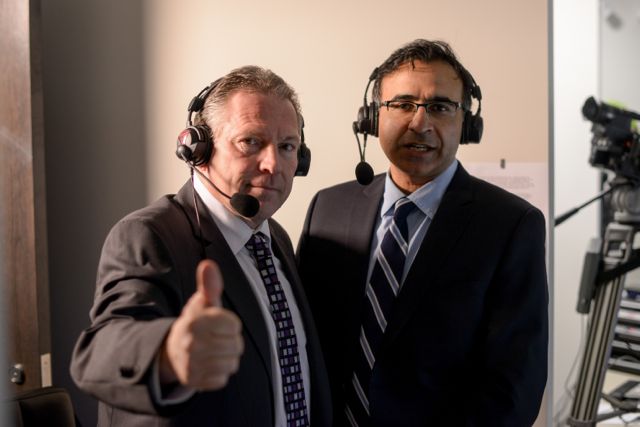Read "Bluelines: Summer Edition" every Tuesday, written by Ranjan Rupal (right), the play-by-play voice, and Greg Theberge (left), a former Memorial Cup winner and Washington Capitals defenseman and hockey analyst for The OHL Tonight on TVCogeco.
There aren’t too many North Bay Battalion players who have logged more playoff games than Mathew Santos.
At last count he was up to 42, sitting tied for fifth, just three games behind 2013-14 overager Matt MacLeod, and just one seven-game quarter-final series behind Brenden Miller. Odds are, by the time next May rolls around, Santos will be the team’s career leader in that category, surpassing Marcus McIvor’s achievement of 54 playoff games.
The mathematics of this is no trivial pursuit. The only way you rack up numbers in this category is if your team keeps winning playoff games. And with Santos in the lineup, the Battalion has been winning playoff games.
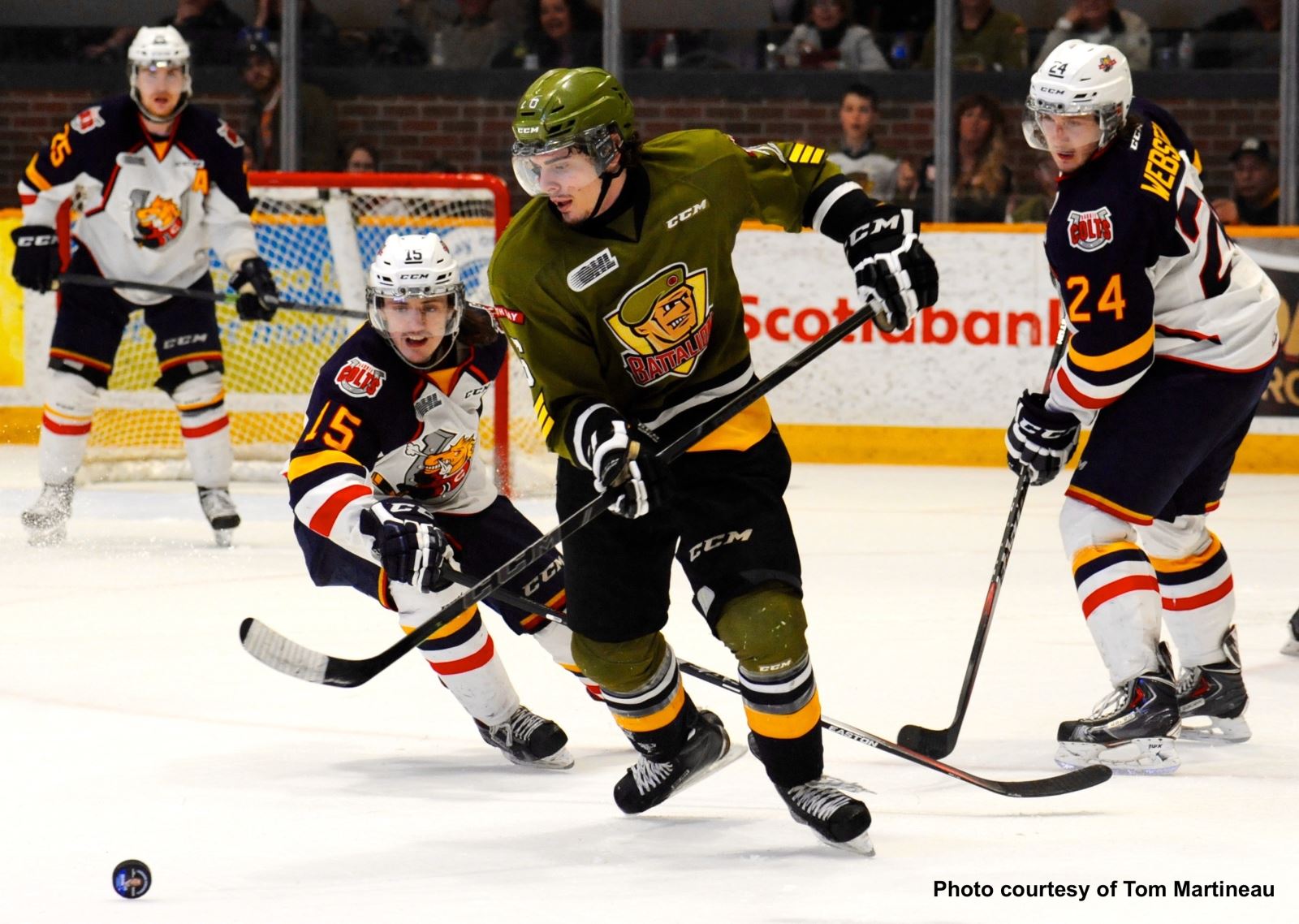
Outnumbered but not outdone: Mathew Santos maintains puck possession in the offensive zone
The OHL Tonight on TVCogeco hockey analyst Greg Theberge and I routinely identify PPP’s…proven playoff performers, and Mathew Santos has emerged as a player who becomes a difference-maker when the post-season rolls around. He was a key player on the 2013-14 Bobby Orr Trophy-winning squad, forming a shutdown line with Jamie Lewis and Connor Jarvis that brilliantly confined opponents in their own zone, with a merciless display of cycling, puck pursuit and vigorous board battles that wore down defenders.
This past season, with Jarvis playing CIS hockey, and with Lewis having been been dealt to the Windsor Spitfires, Santos was forced to re-imagine his role on a team that was trying to carve a new identity. Yes, the Battalion was still the defending Eastern Conference champions, but the cast had changed dramatically. Barclay Goodrow, Ben Thomson and Vincent Praplan were gone, and the swagger of a team coming off a deep playoff run had been replaced by early season questions that begged for answers.
In the early going, Santos played on the top line occasionally, and for the Thanksgiving Day classic against the Barrie Colts was paired with Mike Amadio at centre and Nick Paul on the left wing. True to form, Santos created time and space for his talented linemates, and Paul ended up with a hat trick, Amadio with a pair of helpers, and Santos with an assist accompanying a tidy +3, in a 4-1 win.
With December came a Battalion lineup minus Nick Paul, the star forward away at Team Canada tryouts, and with a Thursday night tilt against Jamie Lewis and the Windsor Spitfires looming, Santos was re-inserted into a top line with Mike Amadio, and import forward Hampus Olsson, playing in just his 20th OHL game, on the left wing. This time the motley line failed to generate any sort of traction. Up until that point, Santos had been a fixture on the third line, with Ray Heuther at centre, and a revolving door of left wingers: Zach Bratina, Brett McKenzie, Mike Baird, David Sherman, Owen Green, Jared Steege and Hampus Olsson. On a couple of occasions, Santos found himself penciled in on the second line, with McKenzie at centre, and Bratina on the left side.
The Battalion lineup was a Rubik’s Cube, with head coach Stan Butler twisting it and turning it, switching it and shifting it, straining to line up his colours and find combinations that would click into place for something beyond just regular season chemistry, but for the playoff drive that was drawing nearer by the day.
The trade deadline deals that brought Nick Moutrey in from Saginaw, and Ryan Kujawinski over from Kingston, were a two-click solution that instantly solved the Rubik’s conundrum for Butler and the Battalion. Indeed the acquisition cemented the top-6 battery but also, rather ingeniously, forged a third line in which Santos could thrive, pairing him with Ray Heuther, a trustworthy centre with whom he played much of the season, and a late-blooming star in Brett McKenzie on left wing, a draft-eligible player with much on the line.
And thrive he did.
Santos and his linemates collaborated to land the knock out punch against the Kingston Frontenacs in Game 4 of the quarter-final series at the K-Rock Centre, with Santos scoring both the winning goal, and the insurance marker in a series-clinching 3-1 win.
“Santos’ role on that line was making sure the puck exited the zone and to hit Brett McKenzie coming cross ice with speed," said Theberge, "or have Ray Heuther supporting the puck on his side and make sure they both get the puck out of the zone. What sticks out most in my mind is they were very responsible defensively and they were relied upon heavily for their defensive play.”
In the semi-finals against the Barrie Colts, Santos struck again, once more on the road under hostile conditions, where PPP’s most often prove their mettle, this time a pair of bookends, the first Battalion goal, and the seventh, in a 7-5 win to take the series.
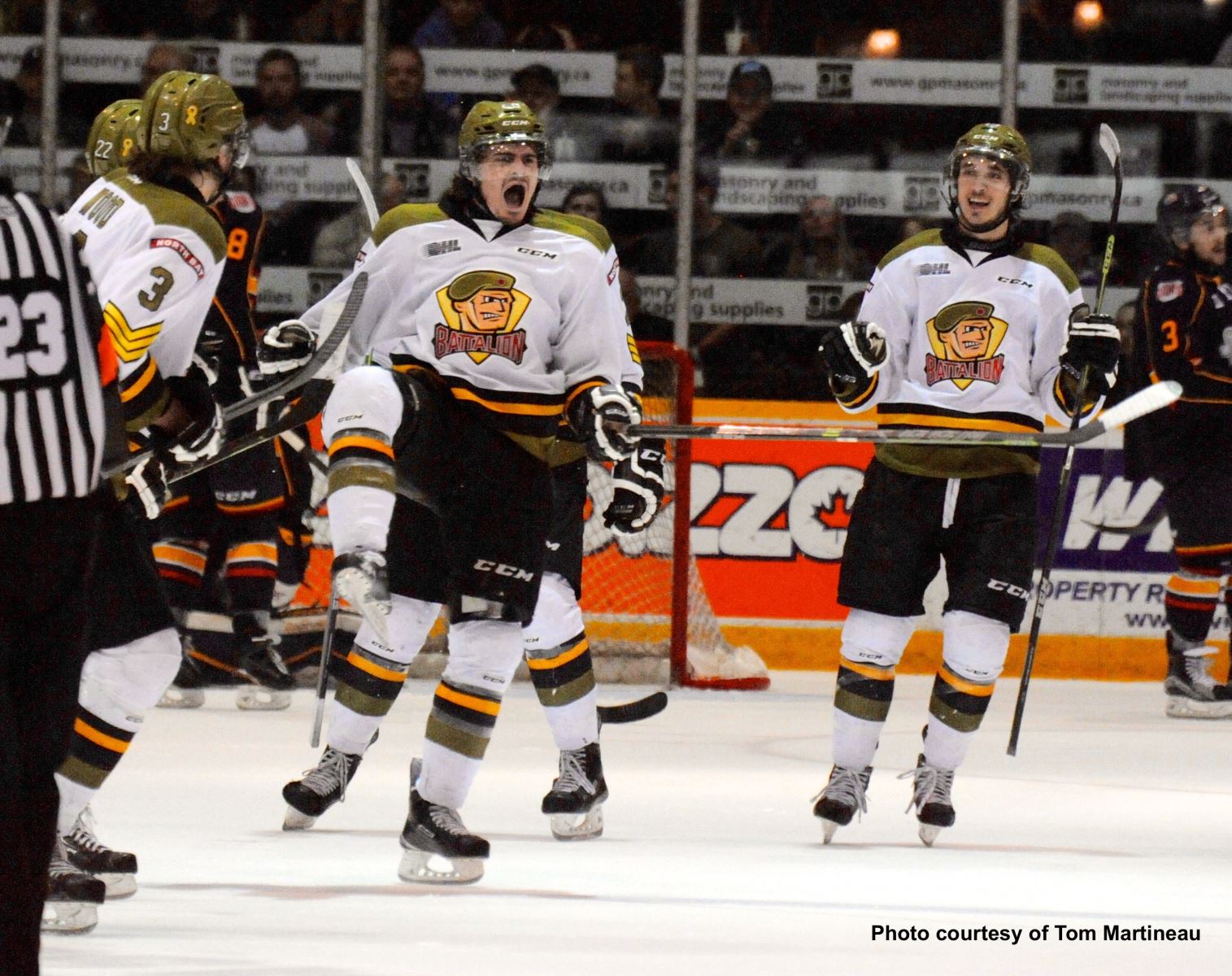
With a knack for scoring key playoff goals, Santos will be counted on in 2015-16
“What I like most about Matthew Santos’ game is his strong board play in both the offensive zone and especially the defensive zone,” said Theberge. “He’s very strong along the wall with excellent chip plays off the wall and very seldom turns the puck over.”
Against Oshawa, Santos was once again a presence. As the Battalion struggled to find offense against the eventual Memorial Cup champions, Santos delivered a goal and an assist during the last five games of the series – factoring in two of the team’s six goals over that span. Often when nothing else is working, when your team needs a goal, it’s going to come from your hardest workers: a Kyle Clifford or an Andrew Shaw, for example. It’s just how winning teams win. Mathew Santos is one of those guys.
Theberge has come to respect the contribution that Santos makes when he’s on the ice. Why? Probably because he spent a pro career on the defensive side of the puck, and appreciates when a forward like Santos helps out in the D-zone. Theberge feels Santos can now provide leadership in the room as well.
“As an elder statesman I would like to see Santos become a calming influence out there with the rookies and sophomore players,” said Theberge. “He can show them the way to behave, the way to show respect, and demonstrate both hard work and determination. It all spells one word: Santos.”
To learn more about Mathew Santos, I spoke with him as he prepares for his overage year with the North Bay Battalion…
Ranjan: Hi Mathew. I was talking to Jake Smith the other day, and he let the cat out of the bag, saying that you’d be coming back as one of the three North Bay Battalion overagers this year. How did that conversation go with Coach Butler?
Mathew Santos: It was brief, but very exciting. I was talking to him at one of the Sunday skates he holds and he told me I was coming back. It’s an incredible feeling coming back for another major junior year in North Bay. I can’t wait; I’m looking forward to it. I was hoping to get the call back. I wasn’t sure because there were four of us, but now that I heard the news it’s really exciting. He seems to have confidence in me, coming in as a free agent like I did, and putting it all on the line, being a power forward, a physical player.
Ranjan: Last year you had a chance to play on the same line as Ray Huether, and he was a terrific addition as an overage forward. As the lone overage forward this year, what will you be asked to do?
Mathew Santos: I think I’ll be asked to have more of a leadership role, and still play my kind of game, but produce more points. I think you can still finish your checks, hit guys and put some fear into the other team and still be able to put up the numbers. This summer I’ve been working a lot on my in-close tipping, shooting from areas, and finishing in general, but still, in my mind, I think I can punish some defense, and still score goals.
Ranjan: What were you able to learn from Ray?
Mathew Santos: I learned that he’s a really hard-working guy, very skilled - under the radar skilled, sometimes - he shows a lot actually. He was very fun to play with. I learned a lot about work ethic, and that with confidence in yourself you can go a long way. I might be a little grittier than Ray, and he might be a little more skilled, but in general we have similar styles. I was able to learn a lot about how he played, and I’m sure he learned a little bit from me as well. It was very good to play alongside Ray all year. Definitely off-ice, there was a leadership role too. Ray was always a pretty vocal guy in the dressing room, and he liked to joke around, keep it nice and loose in the dressing room, but still have that demeanour of being a leader in the room and on the ice.
Ranjan: Greg Theberge and I have been impressed with your game since day one. How have you become such a responsible player in the defensive zone?
Mathew Santos: Throughout my hockey career, I had only three coaches actually. Growing up I played for Mike Ricci with the York Toros, and then both he and Matthew Ianetta with the Vaughan Kings, some very defensive-minded coaches who taught me to play the defensive side of the puck first, and take care of offence when you have the puck. Coming to the Battalion, Coach Butler has taught me a lot about defense, about being positionally sound in the defensive zone. I think it’s helped me throughout my OHL career, and I think it might be a reason why I’m back again this year, to help out on penalty-kill, and situations in the game where they need a defensive play.
Ranjan: In that case, you’d be the perfect guy to ask. As soon as the puck is turned over in the offensive zone, what is Mathew Santos' first assignment?
Mathew Santos: My first assignment is to get back and help out the D as quick as possible, tracking down the man with the puck, forcing him to make a play he might not want to make, or intercept the puck and go back the other way.
Greg Theberge (via text): Mathew, it’s just an observation by myself up in the broadcast booth but you seem to play a lot bigger than your 6-foot, 195-pound frame. Who inspires you to play the gritty style that you bring each and every game?
Mathew Santos: It was actually my older brother, Chris. When I was young I went to a lot of his games. He was always that player that threw his weight around, go in the corners, battle it out, take it hard to the net, and go to the garbage areas around the net...just be a menace on the ice, and a player that nobody wanted to be around, and that the other team feared. I just want to be a player who leaves an impact on the game.
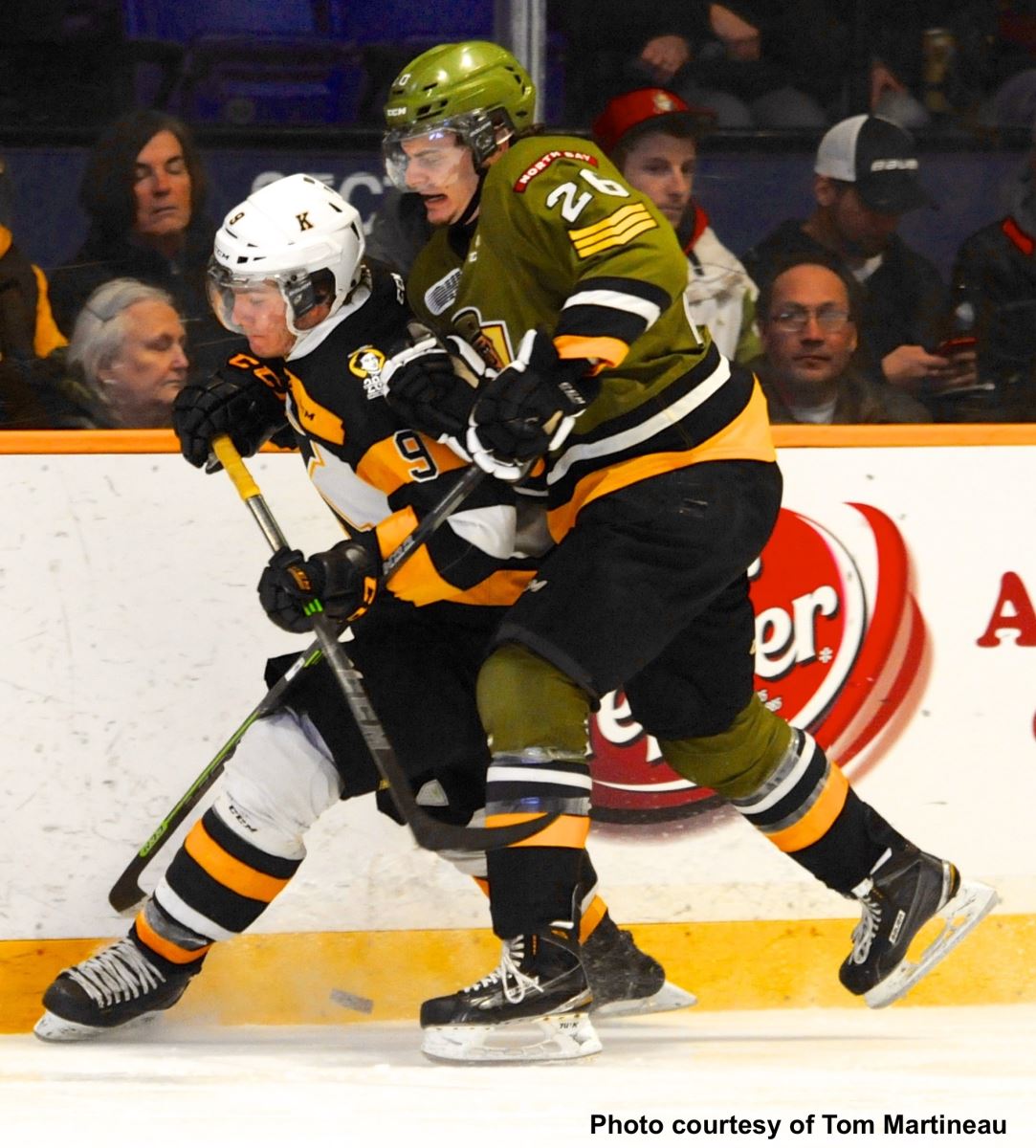
Mathew Santos teaches Frontenacs' centre Ryan Verbeek (9) that the road less traveled is less traveled for a reason
Ranjan: You have delivered many bone-crushing checks, especially to those unfortunate defensemen whose job it is to retrieve pucks in their own end. Is there a right time, or wrong time, for Mathew Santos to punish that defenseman?
Mathew Santos: I think the severity of the hit, perhaps. Maybe later in games where it’s a little tighter, and you need an offensive spark, maybe not as big of a hit, but you still finish the check, and let the D-man know you’re going to be there all game. You keep hitting him, and go after the puck, and try and create an offensive opportunity there.
Ranjan: I would say Zach Shankar and yourself deliver the hardest hits on the Battalion. Is there anyone else on the Battalion who you think can deliver the mail in the same way?
Mathew Santos: I think Zach Poirier. Poirier’s a very good example as well. He might not show it every game, but he can sure line up a body and can throw his weight around.
Ranjan: You’re tough. You’re rugged. You don’t back down. I see a number of roughing penalties over the season, and you’re often taking a guy with you. But no fighting majors. When things heat up on the ice, how do you draw the line?
Mathew Santos: I like to stay away from getting penalties in general, but if I do end up getting one of those roughing calls hopefully I’m taking one of their better players away, with me. I’m not much of a fighter, but I do like to get in their face, and I think I’m more effective on the ice, than in the penalty box, so I’d rather not spend time there, and more time on the ice.
Ranjan: Let’s look back for a moment. You went undrafted in the 2011 OHL Priority Selection. What affect did that have on a younger Mathew Santos?
Mathew Santos: It wasn’t that hard on me. I wasn’t really going into it expecting to get drafted. But it definitely motivated me, for sure. I didn’t let it bring me down, I used it as fuel to prove all the scouts wrong, to get better, to show them what they missed out on...and I did exactly that.
Ranjan: Your major midget year with the Vaughan Kings was exceptional – leading that team in scoring, and then you carried your high school team, Michael Power, to the OFSAA championships in 2012. Did your approach change?
Mathew Santos: I was working more on my skill set because I wasn’t a very skillful player. Defensively sound? Yes. That’s what my coaches were talking about. The offence I had to work on a lot, that summer. And the next year, it really helped me out, having confidence, playing alongside my brother on my school team, and playing along with some good guys with the Vaughan Kings. It really boosted my offensive confidence going forward.
Ranjan: Michael Power Trojans in a long way from the OHL. How did the Battalion find you?
Mathew Santos: Yeah. Coach Butler said he had me on his radar for a bit, even throughout the season in midget. But I emailed three teams in my area: Oshawa, Mississauga and Brampton. Brampton was the only team that invited me to their main camp. I went to their main camp and put everything on the line, and they liked what they saw, they were impressed, and they signed me right there at the camp.
Ranjan: With each new season there are fewer and fewer Troops who played at the Powerade Centre. With no guarantee that Kyle Wood or Mike Amadio will be back next year, you might be the last of the Brampton Battalion. What would that mean to you?
Mathew Santos: It means a lot. Being part of the move to North Bay was big, but I still keep the memories I have from Brampton, and the friends I made there and the fans. When my year’s up in North Bay, it’ll be a pretty emotional time. Brampton was there for me, and they were the team that put their hopes in me, and I hope to never let them down.
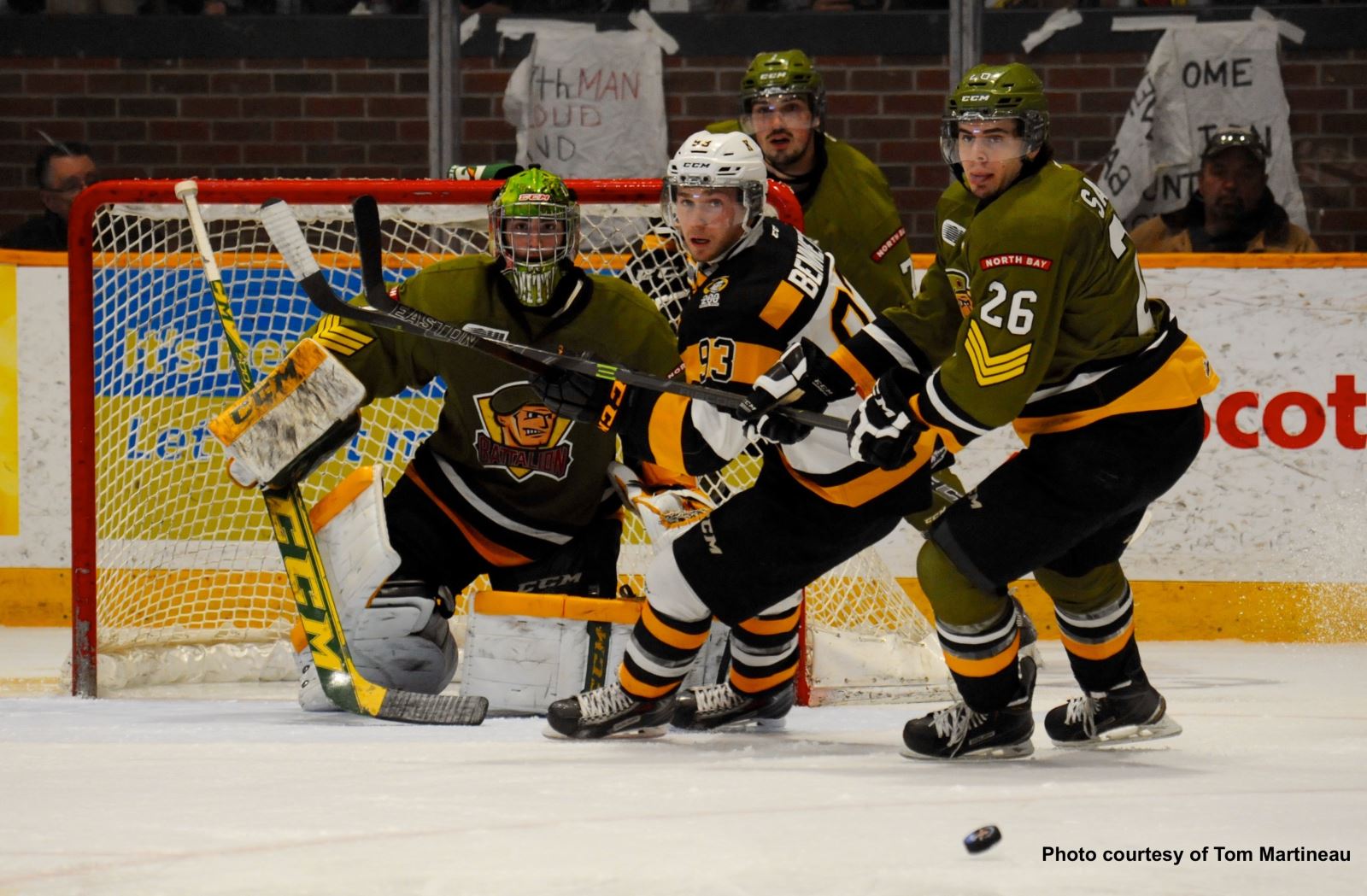
Strength in numbers: Frontenacs' forward Sam Bennett can't evade the backchecking of Mathew Santos
Ranjan: You’re about as Toronto as a guy can get. Describe your transition from Brampton to North Bay…
Mathew Santos: I think it’s been a fantastic transition. I love North Bay. I’ve always been someone who went camping in Huntsville every year, so being in the outdoors and the small-town living wasn’t a big change for me. But it was very easy coming in. I had great billets in Nadia and Vince Gagne, and with Kyle Wood being my roommate. With the fishing and all the outdoor activities you can do in North Bay, it’s a great city and the move was very easy for me. The fans are great. It’s always a boost when you hear the fans getting into it and you want to throw that hit, and get the fans into it, and boost the morale on the bench and boost their energy. You just want to build and build and the crowd brings you higher and higher, and helps you elevate your game to the next level.
Ranjan: No one will forget the first season of OHL playoffs in North Bay. Of course Jake Smith was great; Barclay Goodrow was great. But to me, this team doesn’t win the 2014 Bobby Orr Trophy without Mathew Santos, Jamie Lewis and Connor Jarvis working their tails off on that fourth line. How did you guys do it?
Mathew Santos: It’s not always easy being on the 4th line, but when Coach Butler has confidence in you to put you out there, it definitely helps out. We were a very deep team that year and Jamie Lewis and Connor Jarvis were great players. We were like a sleeper line. Nobody really expected us to do as well as we did. We were just three hardworking players. We just went out there, and executed the system that Coach Butler had for us. We had great chemistry; we always knew where each other were on the ice. It was a great experience and a great time playing with those two guys. I’ll remember it for the rest of my life.
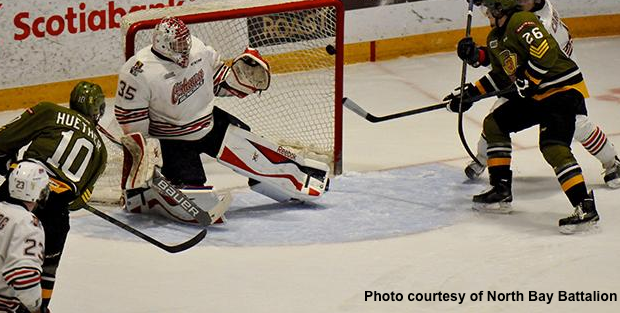
Ray Heuther and Mathew Santos click against the Oshawa Generals in Game 3 of the conference finals
Ranjan: I notice a bit of a pattern…one year later and it’s the 2015 playoffs. Once again, you’re the common denominator in a highly effective 3rd line, this time with Ray Heuther and Brett McKenzie. What made you guys click?
Mathew Santos: I would say that I could fit in a variety of playing styles, but being that type of role player helped me out, for sure. Like 2014, these guys were great guys to play with as well. Very similar to the year before but, I would say, a little more skilled. Ray and I were playing together for the majority of the season and we had great chemistry, and with the addition of Brett McKenzie we had a very dynamic trio, that we could forecheck hard, we could put the puck in the net, we could play defense. We could be a very effective line out there, each and every night. We would sit aside before games, and dissect how we play, and figure out what we could do to be better, and what we could learn from each other, and how we could go about going at the other team.
Ranjan: Greg and I often talk about PPP’s: proven playoff performers. You are on that list. What is it about the post-season that brings the best out of #26?
Mathew Santos: It’s a different beast altogether. You play the same team, possibly seven times. They will dissect you, just like in science class, and you’ve got to be that much better, and that much stronger, and be prepared for every opportunity you have. You have to perform at your very best. To me it’s just elevating your game, or trying to, and just bearing down on the opportunities you have, either to make a play in the defensive zone to get the puck out, or making a play to make the pass, or just getting the puck in deep at certain points of the game. It’s really about bearing down, and minimizing the mistakes you make. It’s the most important time of the year, and you just want to make sure you not holding the short end of the stick.
Ranjan: The season ends on Game 68, and playoffs begin a few nights later. You can’t just turn it on at that time. When does the playoff switch go on?
Mathew Santos: I would say you gradually get better over the season. Coach Butler always says in practice: you either get better, or worse, every day. And I think that’s right. The more prepared you are, the better you get for the post-season.
| Season | Team | GP | G | A | P | +/- | PIM |
| 2014-15 | North Bay Battalion | 67 | 11 | 18 | 29 | +6 | 42 |
| 2013-14 | North Bay Battalion | 63 | 6 | 8 | 14 | +5 | 48 |
| 2012-13 | Brampton Battalion | 57 | 7 | 8 | 15 | -3 | 18 |
| 2011-12 | Vaughan Kings major midgets | 61 | 25 | 39 | 64 | 64 |
Career regular season stats for Mathew Santos
Ranjan: You’ve put up some modest numbers in your three years with the Battalion, including 29 points last season. On numerous occasions people in, and around, the organization tell me you possess a pair of slick mitts. What say you?
Mathew Santos: [laughs] I’d like to think I do. It’s just adding another dimension to my game. It’s working on my hands. I’ve got the physical part of my game down pat. I just have to add the dynamic part to my game, where I can hold the puck, move it around, be pretty good with it, and put the puck into the net. I don’t think I’m that far off. It’s an aspect of the game that I think has been a little weak over the years, but I want to be that guy who can be counted on to put the puck in the net and produce.
Greg Theberge (via text): I seem to recall Mathew barreling down the right wing wall and then driving to the net, faking forehand, and going back hand for a couple of big goals…
Mathew Santos: It’s an effective move, a power move, for sure. It’s something I learned from Nick Paul, who’s really good at it. He’s got a big body, a big frame to protect the puck. It’s something dynamic I can add, different moves to go to the net and different ways to put the puck in the net.
Ranjan: The highs and lows of a long season… High: November 14, 2014: you score 3 powerplay goals against Peterborough. Low: the very next game signals the beginning of a 30-game goal-scoring drought. Then, back on high again: you score 3 goals over the next five games. Take us through that…
Mathew Santos: It’s a mindset thing. Once it gets into your head, a couple of games in, you say it’s not that bad. Then it gets bigger and bigger, and you start thinking about it, and it starts to spiral in your mind. It was a really hard time on me. I mean, the three goals that night, getting a hat trick in the OHL was pretty special. On the downside, it was really hard for me. I felt the pressure. It was an emotional time for me. I felt like I was snake bitten, and every time I tried to score, it just wouldn’t find the back of the net for me. I’m working hard this summer to try to avoid that at all costs this year. Hopefully that doesn’t happen again. On the positive side, all the guys were pretty supportive during that time. They were like keep bangin' away, it’s got to go in eventually! Assistant Coach Dean was a really big believer in me, and put his faith in me. He kept giving me the confidence to go back out there, and keep givin' her, keep givin' her! You’ve got to be mentally tough to avoid going on a drought like that. Getting the first one after all those games was definitely a relief! I even remember the goal. It was in Belleville, a shot from the point, it was a tip, and then I rebounded and slid it in! Then with that little bit of confidence I went on a little roll, and it carries you forward.
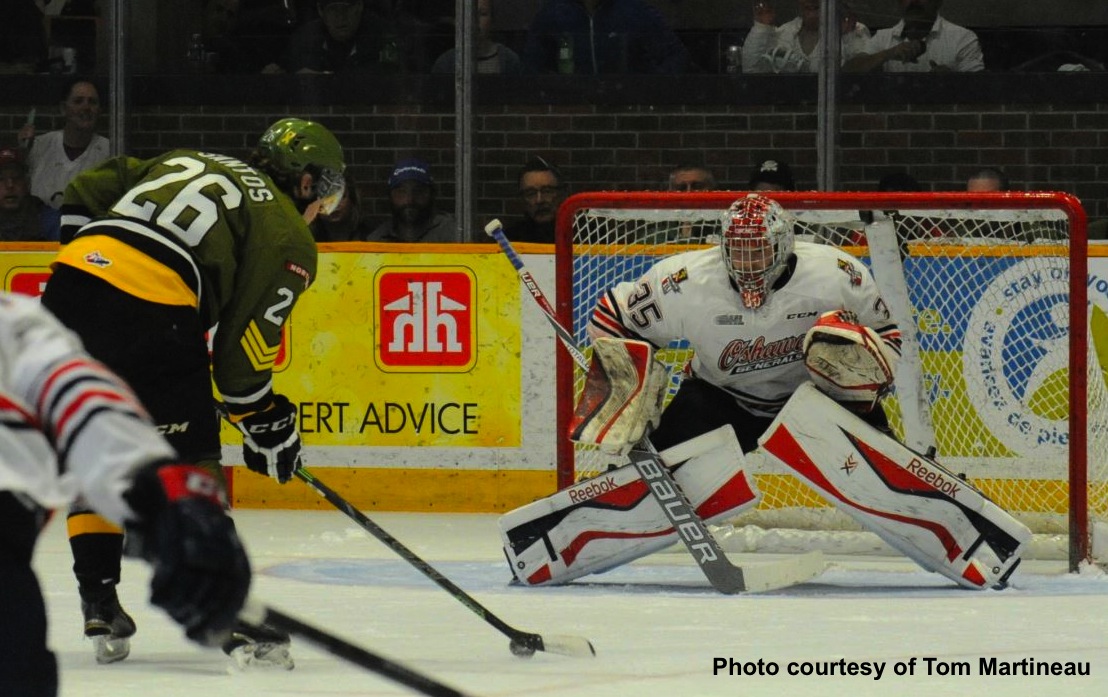
Mathew Santos shoots (and scores) against Kenny Appleby and the Oshawa Generals in the playoffs
Ranjan: As you get ready for training camp, what does your off-season training consist of?
Mathew Santos: Most of my workouts consist of just all-around strength building, and just getting bigger and stronger in all facets of my body. Definitely working on quicker feet, and more explosive power out of my strides, and out of my shots. I do a little in the gym, working with the weights, and a little dry land, working with ladders and parachutes, and on the ice, working on my shooting and in-close puck handling.
Ranjan: I mentioned it to Jake Smith, this idea that Brenden Miller earned a pro contract following his overage year. Does the possibility of a pro contract serve as motivation for you?
Mathew Santos: For sure. He was a major leader in our dressing room last year, and a major performer on the ice as well. I’ve learned a lot from Brenden: his work ethic and the emotion he brings to the game is definitely up there. His intensity is an inspiration and motivation for me to do the exact same, and hopefully earn a contract at the end of the year.
Ranjan: What are your goals for your final season in the OHL?
Mathew Santos: I definitely want to be a leader on this team, and bring a similar aspect to those teams that we’ve had the last few years: a good, solid, strong team that can make a push for the playoffs, and in the regular season. I want to be able to put up the numbers to back that up as well.
Ranjan: Greg and I had the privilege to meet Karen, your mother, during a hockey game at Memorial Gardens. How important has family been in your hockey journey?
Mathew Santos: To me, family has been the most important thing in my hockey career. They’ve been fans of the game ever since they were little, and they’ve instilled that in me. They’ve been supportive and that’s a confidence booster. It’s always nice to see them in the stands, or they'll talk to me after games saying they watched it back at home. If they had the choice, they’d be watching at all the games and maybe all the practices too!
Hey Battalion fans! It's never too late to catch up on your summer reading!
Bluelines August 11, 2015: Rivalry with Barrie Colts promises to heat up http://www.baytoday.ca/content/sports/details.asp?c=82384
Bluelines August 4, 2015: Catching up with... Jake Smith http://www.baytoday.ca/content/sports/details.asp?c=82189
Bluelines July 28, 2015: The secret life of goalies http://www.baytoday.ca/content/sports/details.asp?c=81806
Bluelines July 21, 2015: Catching up with...Miles Liberati http://www.baytoday.ca/content/sports/details.asp?c=81301
Bluelines July 14, 2015: Veteran NHLer leads Hamilton's return to OHL http://www.baytoday.ca/content/sports/details.asp?c=79867
